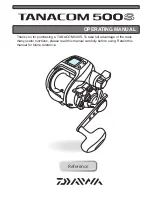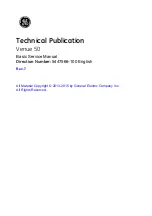
B-35
B.8.4 RESISTENZA DEL
TERRENO
Prima di stabilizzare la macchina è
necessario verificare che il suolo o
qualsiasi altro appoggio, possa
sostenere la pressione causata dagli
stabilizzatori.
Se questa pressione, infatti, supera
quella ammissibile (vedi Tab.
B-3),
bisogna aumentare la superficie
d’appoggio per scongiurare il rischio di
perdita di stabilità (vedi §A.1.7).
Se si utilizzano piastre
supplementari per aumentare la
superficie di appoggio degli
stabilizzatori è necessario
assicurarsi che queste non cedano
sotto carico.
In caso di stabilizzazione su terreno, la
superficie di appoggio minima può
essere calcolata in base alla reazione
degli stabilizzatori e alla portata del
terreno: la reazione massima sugli
stabilizzatori è riportata nell’allegato
Dati Tecnici (vedi
§D.1.1). I valori
indicativi per la portata dei terreni sono
riportati in Tab. B-3.
B.8.4 GROUND RESISTANCE
Before stabilising the machine check
that the ground or support surface is
capable of withstanding the pressure
caused by the stabilisers.
If this pressure exceeds the maximum
permitted value (see Tab. B-3), increase
the area of the support surface to avoid
loss of stability (see §A.1.7).
Check that any supplementary
sheets used to increase the area of
the stabiliser support surface are
able to support the load.
When the crane is used on open ground
the minimum support surface area can
be calculated on the basis of the
reaction of the stabilisers and the load
capacity of the ground. The maximum
reaction level on the stabilisers is shown
in the enclosure entitled Technical
Specifications (see §D.1.1). Indicative
values for the load capacity of the
ground are shown in Tab. B-3.
B.8.4 WIDERSTAND DES
GELÄNDES
Vor der Stabilisierung der Maschine
muss überprüft werden, ob der Boden
oder jede sonstige Auflage den von den
Stützen erzeugten Druck aushalten
kann.
Wenn dieser Druck den zulässigen Wert
(siehe Tab. B-3) übersteigt, muss die
Auflagefläche vergrößert werden, um
die Gefahr eines Stabilitätsverlustes
abzuwenden (siehe §A.1.7).
Wenn zusätzliche Platten
verwendet werden, um die
Auflagefläche der Stützen zu
vergrößern, muss sichergestellt
werden, dass diese nicht unter der
Last nachgeben.
Bei Stabilisierung auf dem Boden kann
die Mindestauflagefläche anhand der
Reaktion der Stützen und der
Tragfähigkeit des Bodens berechnet
werden: die maximale Reaktion an den
Stützen wird im Anhang Technische
Daten angezeigt (siehe
§D.1.1). Die
Richtwerte für die Tragfähigkeit sind in
Tab. B-3 aufgeführt.
Tab. B-3: Portata del terreno -
Bearing capacity of the soils
- Belastbarkeit des Bodens
TIPO DI TERRENO
SOIL TYPE
BODEN TYP
PORTATA
BEARING CAPACITY
BELASTBARKEIT
[daN/cm
2
]
Terreno di riporto, non compattato artificialmente
Fill soil, not compacted
Aufgefüllter, nicht verdichteter Boden
da 0.0 a 1.0
from 0.0 to 1.0
von 0.0 bis 1.0
Terreni naturali, evidentemente vergini (fango, torba, terreno paludoso)
Natural, clearly virgin soils (mud, peat, marsh soil)
Natürliche, klar unberührte Böden (Schlamm, Torf, Sumpfboden)
0
Terreni non coerenti, ma compatti (sabbia fine e media)
Not coherent, but compact soils (fine and medium sand)
Nicht bindige, sondern feste Böden (Fein- und Mittelsand)
1.5
Sabbia grossa e ghiaia
Coarse sand and gravel
Grober Sand und Kies
2.0
Terreni coerenti:
Coherent soils:
Bindige Böden:
- pastoso -
doughy
- teigiger
0
- soffice -
soft
- weicher
0.4
- rigido -
rigid
- rigid
1.0
- semi-solido -
half-solid
- halb-fester
2
- solido -
solid
- fester
4
- roccia -
rock
- Gestein
15
- roccia massiccia -
solid rock
- massives Gestein
30
Summary of Contents for 933/2S
Page 2: ......
Page 10: ...A 1 A MANUALE AVVERTENZE A WARNING MANUAL A ANWEISUNGSHANDBUCH...
Page 61: ...B 1 B MANUALE D USO B OPERATING MANUAL B BEDIENUNGSHANDBUCH...
Page 135: ...C 1 C MANUALE DI MANUTENZIONE C MAINTENANCE MANUAL C WARTUNGSHANDBUCH...
Page 144: ...D 1 933 933C 936 936C D ALLEGATI D ENCLOSURES D BEILAGEN...
Page 241: ......
















































